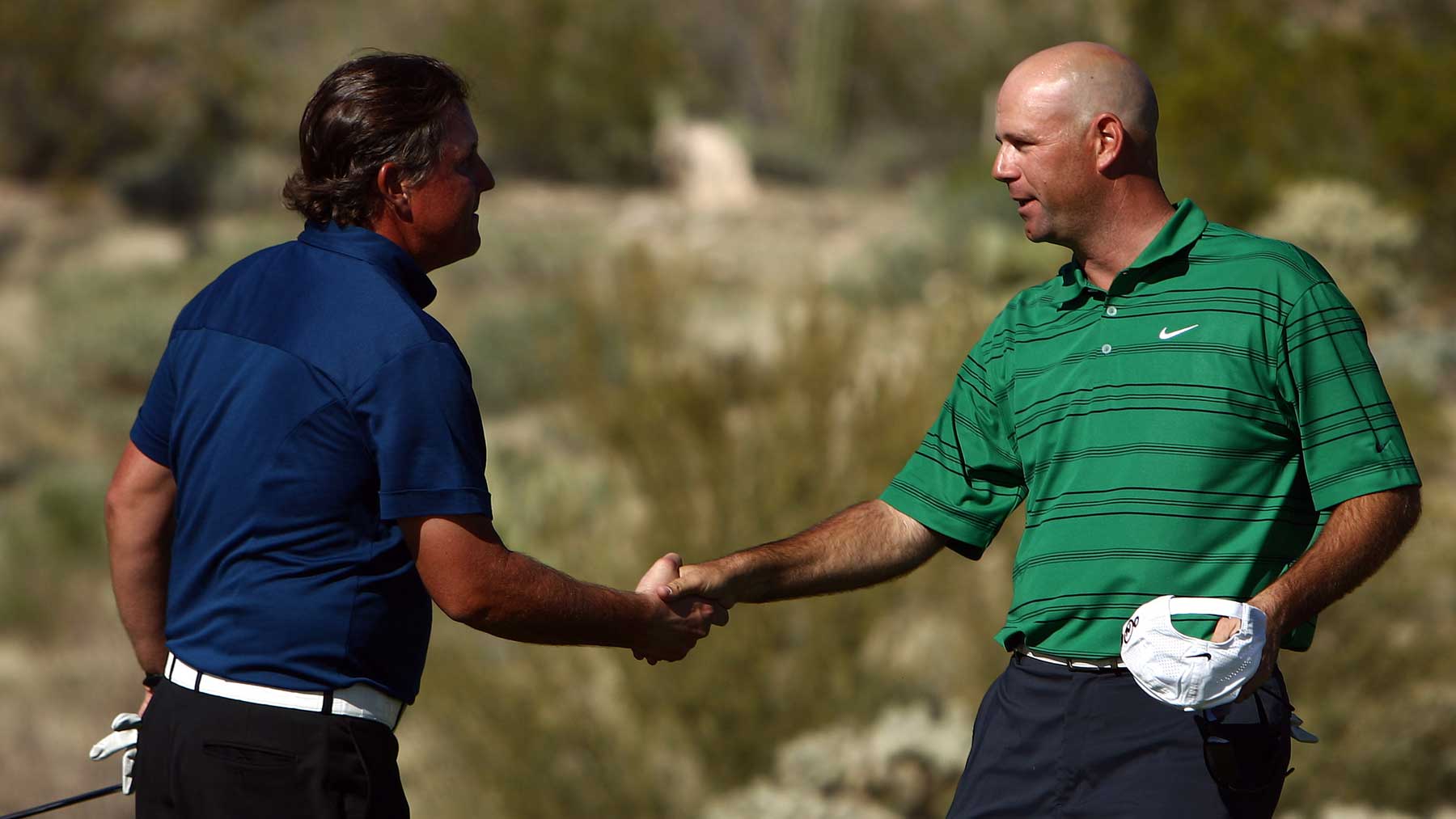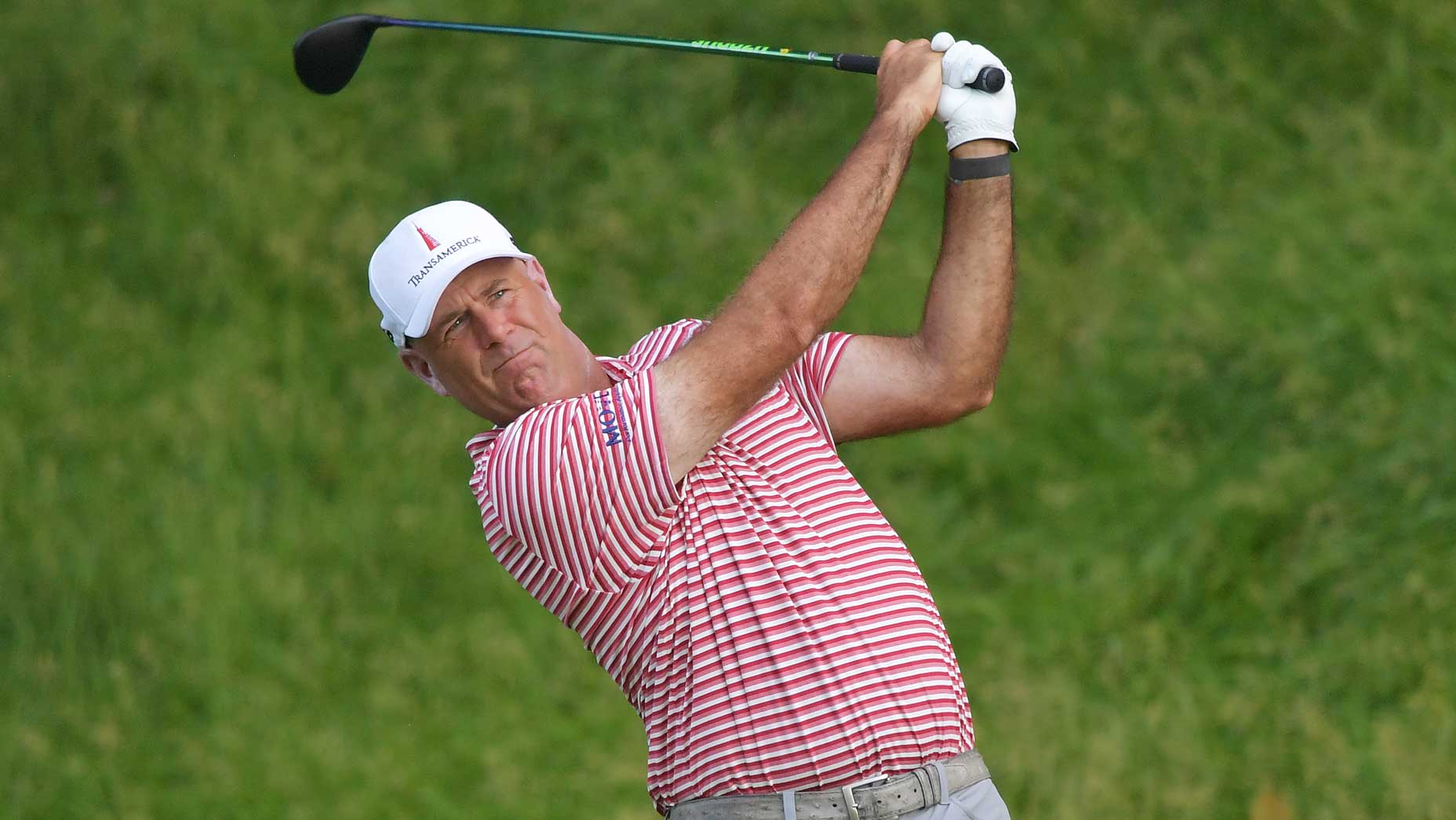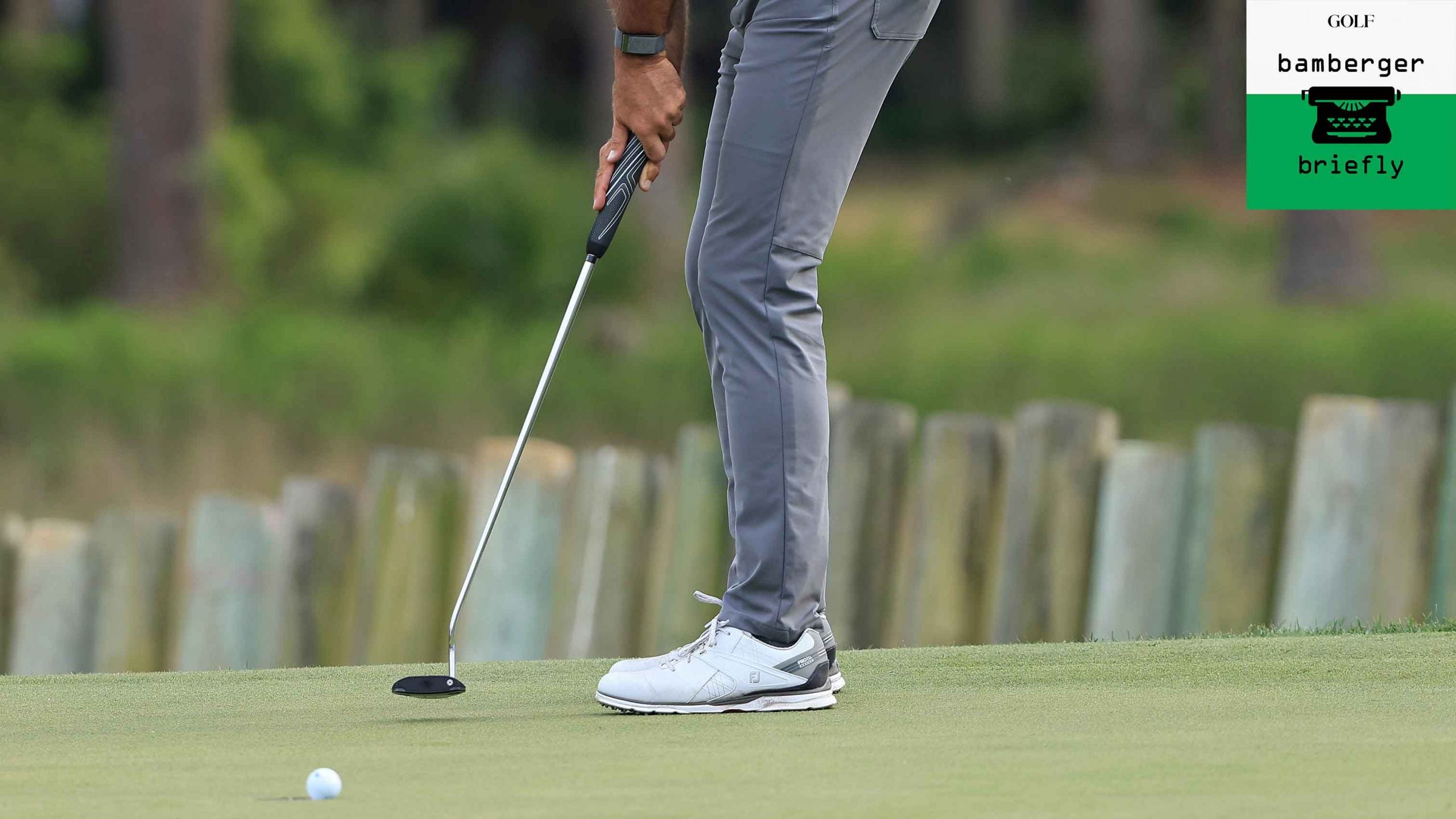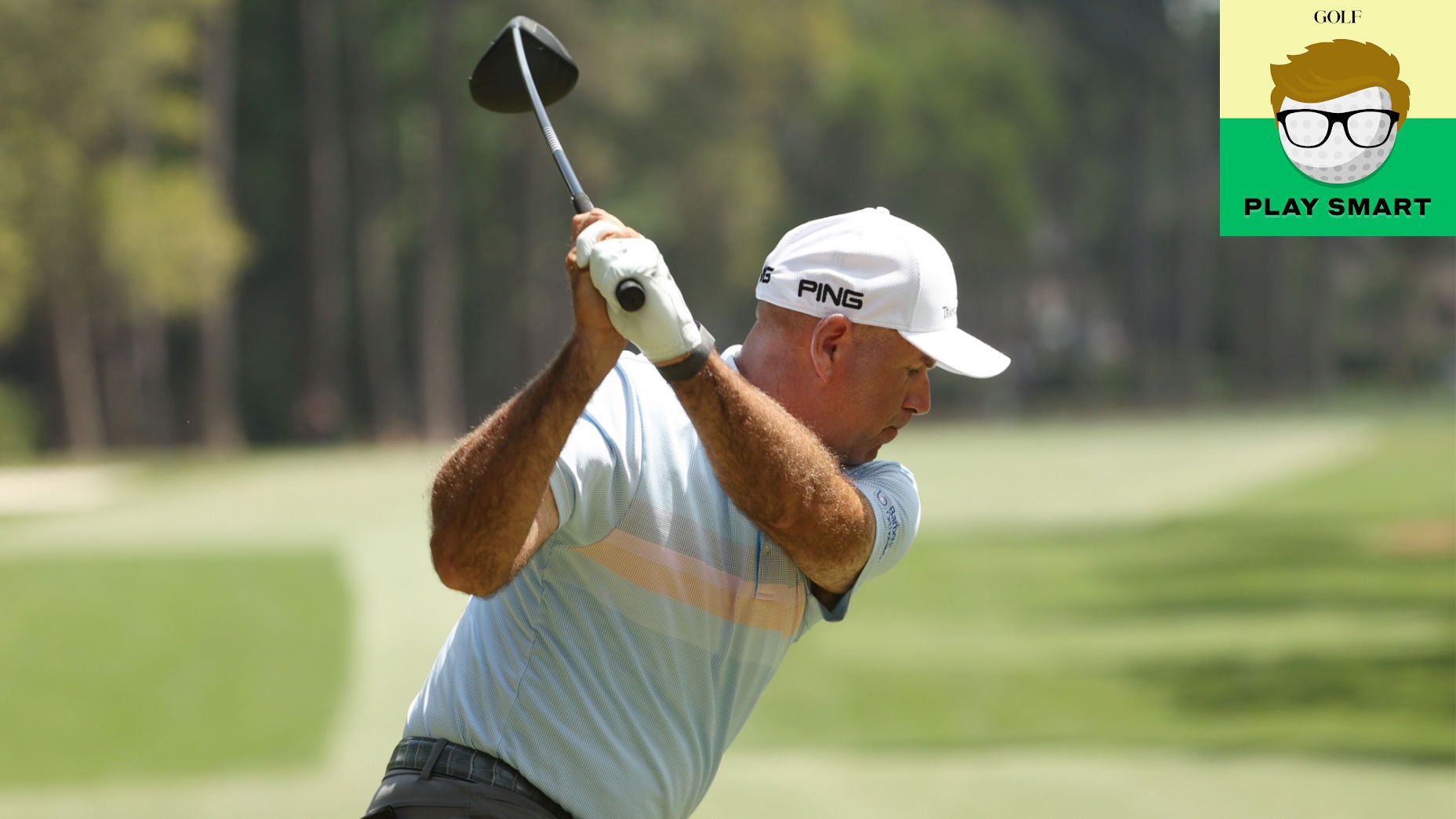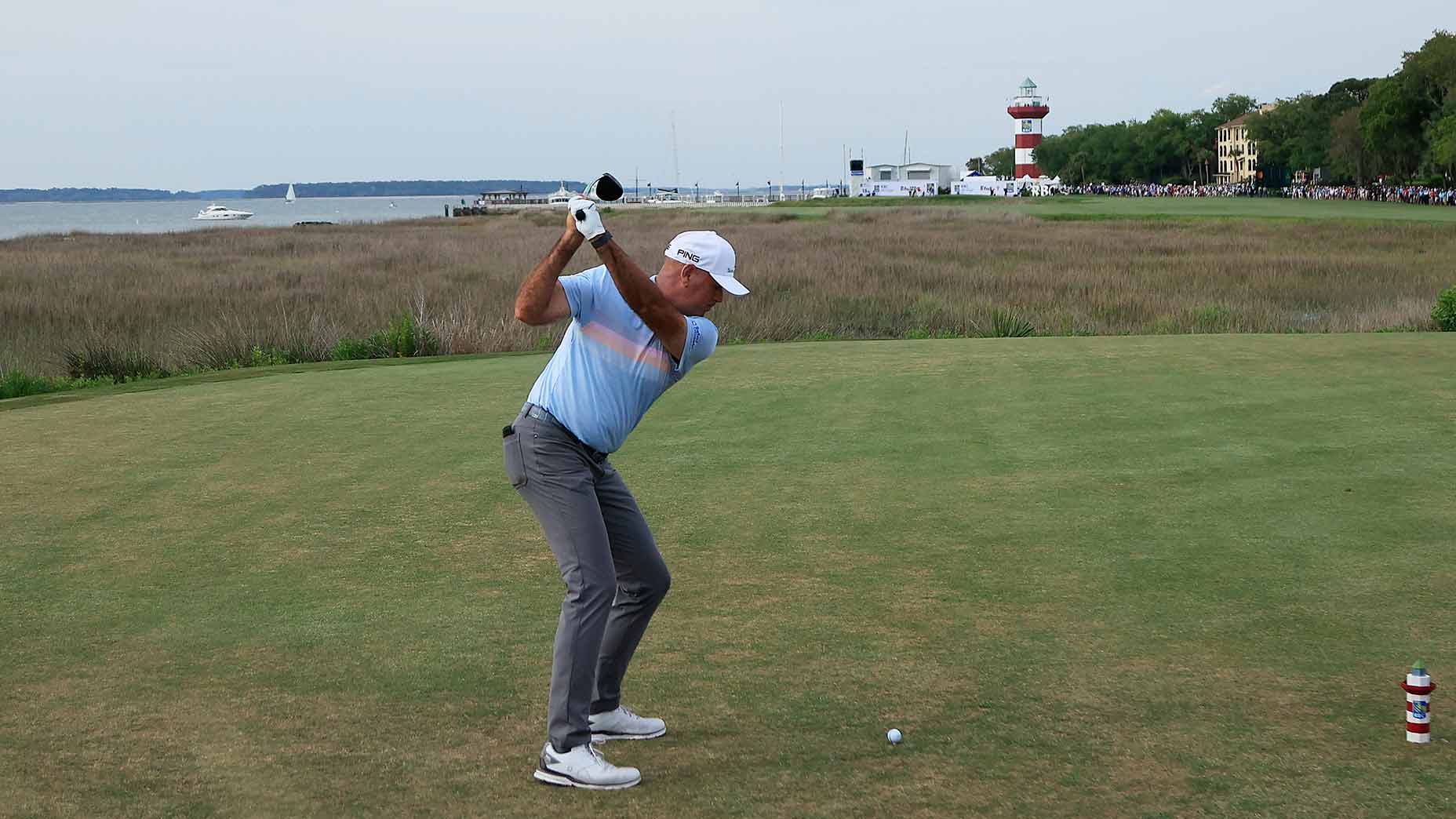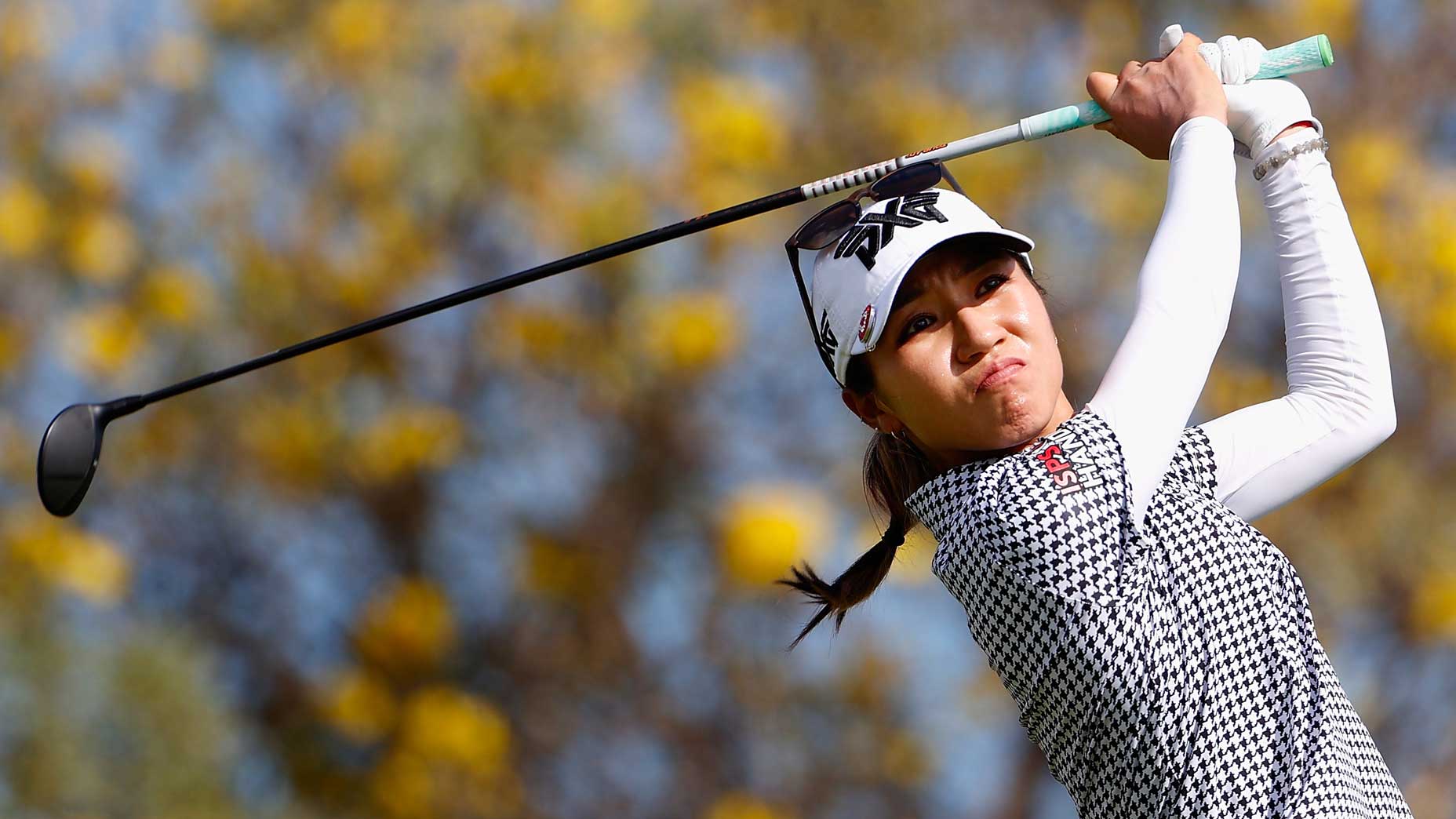Stewart Cink keeps it simple: faith, family and a rock-solid life philosophy
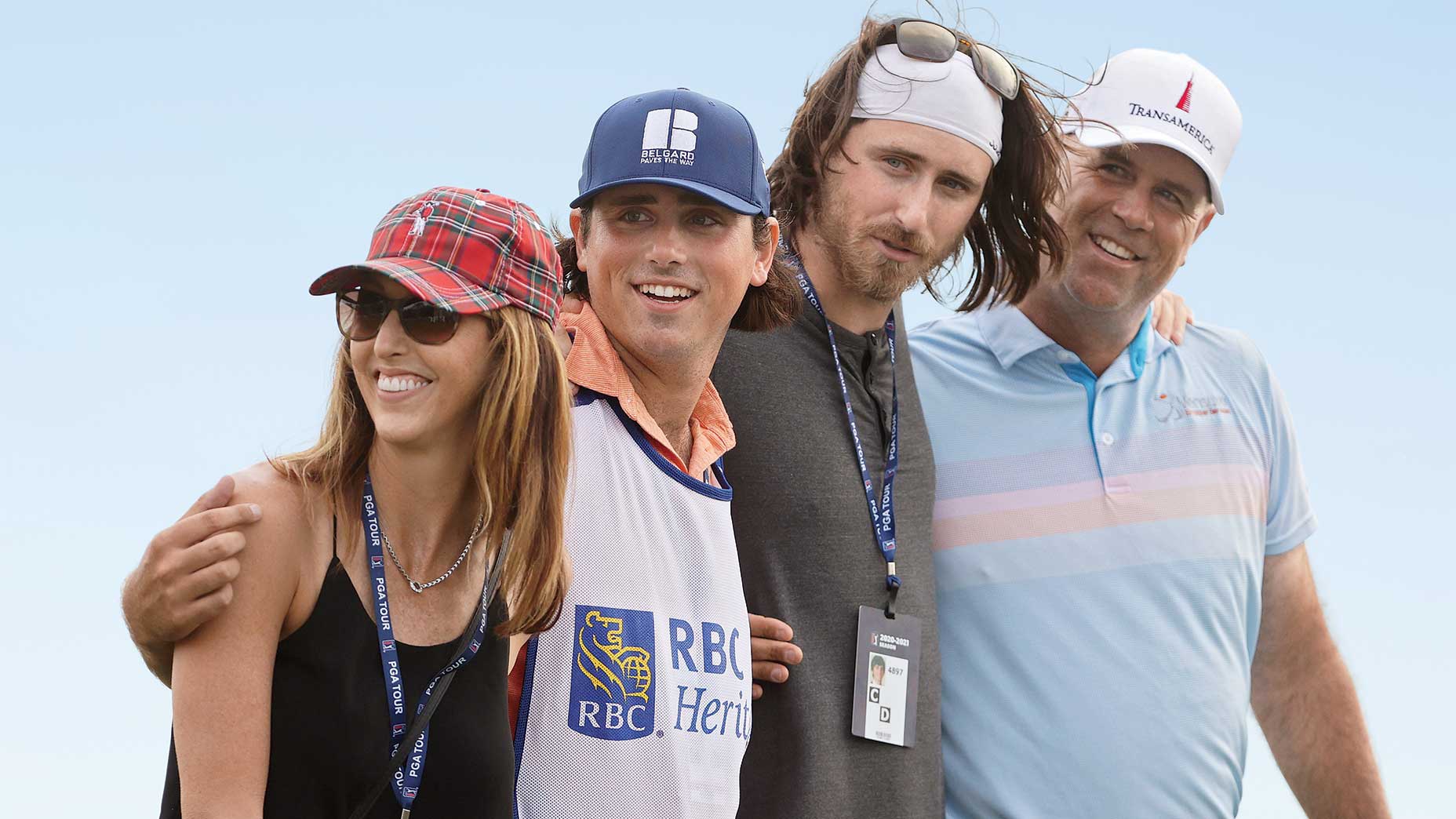
Stewart Cink celebrated his RBC Heritage win with wife, Lisa, and sons Reagan and Connor.
Getty Images
Talk about your sweet spots. Phil Mickelson and Stewart Cink were playing together in Charlotte, N.C., in May, in the Sunday round. Two golfers, almost 100 years between them, and still hitting it square on the face, with speed. Sweetness indeed.
Two golfers marching down Quail Hollow’s wide fairways, neither with any chance to win, chatting about this, chatting about that. As public personalities, neither man is like the other. (Phil’s all look-at-me. Stew blends.) But as sentient beings, these two Open Championship winners are cut from the same cloth. They ask, they seek.
Cink, a few weeks earlier, had won at Hilton Head. Mickelson, after a first-round 64 at Quail Hollow, had shot rounds of 75 and 76. They both had bloodline caddies. Carrying Cink’s bag was his younger son, Reagan. (A family name, not a political statement.) Mickelson’s caddie was his kid brother, Tim. (Saint Philip, Saint Timothy; their mother doesn’t miss Mass.) Mickelson and Cink will both tell you that the caddie-player dynamic is different when your caddie is a member of the fam.
You’re gonna try your best on the shot. That’s all you can do. Consider the shot as best you can. Make the best swing you can. What happens, happens. That’s what I’ve learned.
So, two old-hand Tour players, an early-Sunday tee time, nothing at stake but a check. A breeding ground for intimacy, PGA Tour–style.
“How are you handling getting older?” Mickelson asked Cink, as Cink recalled it.
“The biggest thing for me is focus,” Cink said.
“Me too,” Mickelson said.
“The easy thing would be to do nothing about it,” Cink said.
Mickelson nodded. He’s not the do-nothing-about-it type, and neither is Cink. So, Phil asked, what do you do?
“I stay hydrated and make sure I get enough sleep,” Cink said, trying to get 50 things down to two. Next shots were coming up, as they always are on your way to the house. Phil signed for another 76.
“And then he goes and wins the PGA!” Cink told me. We’ve had a series of interviews and text exchanges, going back to mid-March. His tongue is often in cheek.
As for Mickelson, since Kiawah he has said more than once how much he got out of that round with Cink. A few days after his win at Kiawah, Phil said, “Stewart is striking it so good, hitting the ball long and straight, and he’s having a lot of fun out there, with Reagan at his side.”
I asked Cink about family members as caddies.
“There’s an intimacy inside the ropes that you wouldn’t have otherwise,” Stewart said. “You can be more vulnerable. You can say, ‘I’m scared of this shot.’”
It’s not every golfer who will use those words, but Cink is not every golfer. He saw a therapist for years. Not a “sports psychologist.” A therapist. This is his thing: You want to fix a problem? Take it on. Talk therapy is his starting point.
It’s hard to imagine Hogan or Arnold or Tiger rolling like that. But this space is reserved for Stewart Cink, 48-year-old new-age golfer.
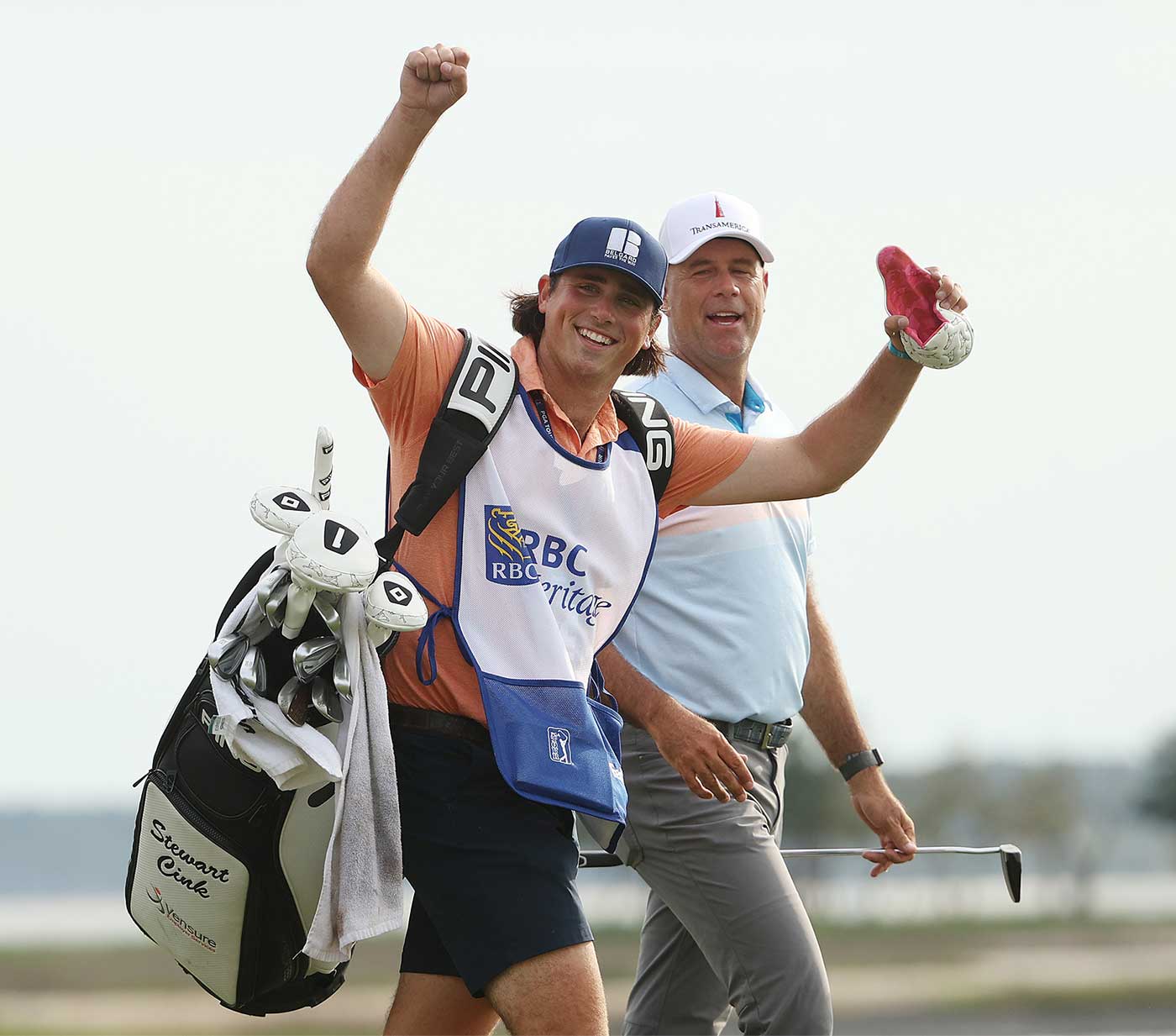
In Stewart Cink’s Wikipedia entry, under Personal Life, there are two sentences that don’t tell all but do tell much: “Cink and his wife, Lisa, have two sons, Connor and Reagan. Cink is a Christian.” Cink’s faith runs from his cleated feet straight through his shaved and hatted head. With that in mind, and nodding to his sense of fun, I asked Stewart to imagine Jesus Christ as a caddie.
Earlier, we had been talking about Jesus as a golfer. Cink imagined Jesus at the top of the World Amateur list and the World Golf Ranking list, asking tournament directors to donate his forfeited prize money to charity. When I asked Cink about Jesus’ practice habits, he said, “He’d make Fred Couples look like Bryson DeChambeau. He’d have other things to do.”
Like caddying for those in need. For this creative exercise with Cink, I took the liberty of making Jesus a caddie in the Masters, standing in the middle of the 15th fairway, working for a young amateur looking to play the last four in even par to make the cut.
Young am to Jesus: What do you think?
Second shot, 230 to carry the pond, 250 hole. Jesus, sandals on his feet, is wearing both his go-to robe and the club’s iconic white overalls.
Cink: “Jesus would say to the kid, ‘What do you think?’”
Young am: I’m afraid of topping it into the water and missing the cut.
“Jesus would say, ‘Why are you afraid of that?’”
Because there’s an expectation that I should be able to pull off this shot.
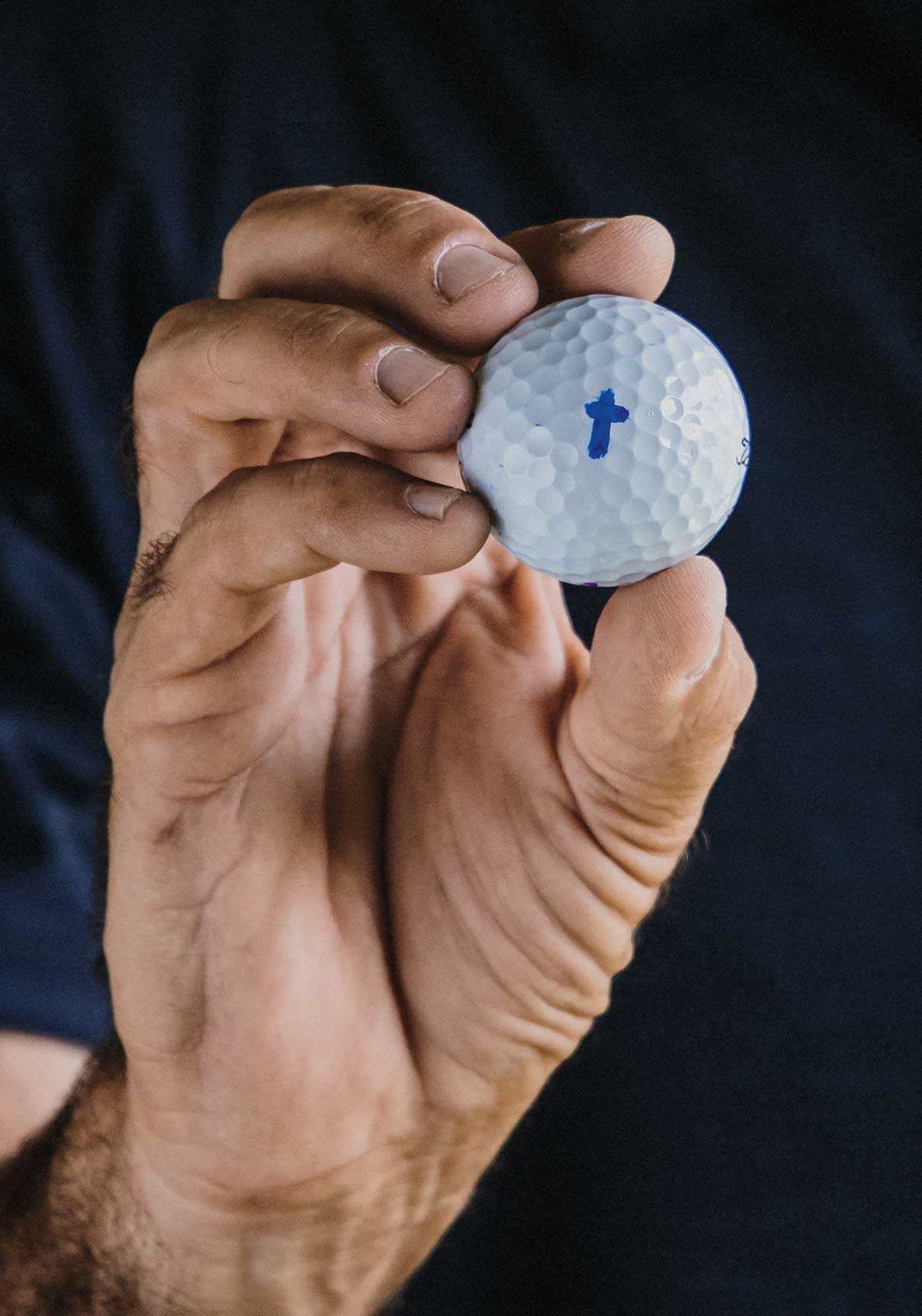
“And Jesus would say, ‘It really doesn’t matter.’
“And it doesn’t. Whether you top it into the lake or not, it really doesn’t matter. You’re gonna try your best on the shot. That’s all you can do. Consider the shot as best you can. Make the best swing you can. What happens, happens. That’s what I’ve learned.”
The lake. So old-school.
Stewart Cink has a whole thing, a philosophy, about expectations. He got it from his wife, Lisa. In April 2016, Lisa was diagnosed with Stage IV breast cancer. It’s in remission. (Knock on wood, PTL and thank ye kindly, MD Anderson.) But with Stage IV, it’s one day, and one test, at a time. Lisa is doing great. But expectations change from the day you get that first call.
We jump ahead to last September. Stewart and Lisa are in a hotel room in Napa, Calif. Reagan, caddying for his father in a Tour event for the first time, was out getting Sunday breakfast. Cink, through 54 holes, was two shots back. He hadn’t won a Tour event since the 2009 British Open, in a playoff with Tom Watson.
“I’m scared,” Stewart said.
Yep, that word again. Not Stage IV cancer scary. A different kind.
“There’s not one person out there who expects you to win,” Lisa said. “You’re out there with Reagan. Have fun, play like you have nothing to lose.”
It’s a family affair. (Here comes Sly, bass shaking the floor: It’s a family affair.) Pep talk by Lisa! Bag-toting by Reagan! Ten one-putt greens by Stew! A win. Eight months later, another one, Connor on hand. Family snaps backlit by the famous red-and-white Hilton Head lighthouse. Both sons are engineers, both are getting married this summer.
Connor is getting short shrift here. He’s at the core of the original Stewart Cink origin story.
Stewart and Lisa were college sweethearts when she called with the news. She was pregnant. They got married in June after their sophomore year. Connor was born three months later. “I had to grow up,” Cink said. He found his way to the library (and graduated from Georgia Tech in 1995 and in four years). He found his way to the driving range (and turned pro right after graduation, winning three times on the Nike tour in 1996). Along the way, he found his way to his God.
A tip of the hat to Connor, for the Stewart-Connor, father-son win at the Father-Son event in Orlando in 2013.
A tip of the hat to Lisa, for her hubby’s win at Napa last year.
A tip of the hat to Reagan, for his dad’s win at Hilton Head.
And then there’s Phil, Phil on Stew: “He’s inspiring.”
Word.





